The Vulnerable Scientist
Only scientists who are honest and authentic or are working towards it will be on this podcast.Professor Brene Brown's research shows that vulnerability fosters good emotional and mental health. It is a sign of courage. We become more resilient and brave when we embrace who we truly are and what we are feeling. The Vulnerable Scientist Podcast is a space for scientists to tell their honest and authentic stories. I am your host Sarah Nyakeri who happens to be a scientist, Informal science communicator and I help scientists create personal websites. If you want to support this show, go to www.patreon.com/thevulnerablescientist.com You can also follow this podcast on all social media platforms @TVScientistPodTheVulnerableScientist.com See acast.com/privacy for privacy and opt-out information.
Episodes
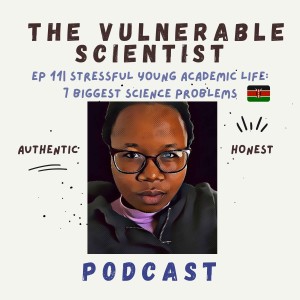
Wednesday Dec 15, 2021
Wednesday Dec 15, 2021
In this episode, I am reading from an article written on Vox: https://www.vox.com/2016/7/14/12016710/science-challeges-research-funding-peer-review-processI got attracted to the article mainly because of the 7th reason which mainly talks of the struggles of young scientists all over the world.The Vulnerable Scientist is a Kenyan-based podcast that focuses on scientists' stories about their daily lives, work, and how they got to where they are. I am your host Sarah Nyakeri, a scientist, informal science communicator and a hiker. I am a multidisciplinary individual that does digital marketing and website design during my free time.The main questions asked that scientists are expected to answer vulnerable are: How are you, Introduce yourself, how did you become a scientist, What are the highs and lows you have experienced in your science career, tell the listeners about your hobbies, what question would you like to answer that has not been asked and how do you feel after having this conversation.Why did I start this podcast? You might ask. When doing my MSc project, my experiments started to fail at a certain period and it was very frustrating. I thought, If I finally get a new vaccine target for CBPP in cows, it would be all smiles but no one will ever know what I went through. I also wondered how many scientists were going through the same rough patch but did not openly talk about it?One day when I had just had a rough day, I talked into a mic about my day and I felt better. That was the first episode. At first, I thought it would just be journalling but after some fellow scientists heard it, they wanted to be Vulnerable too. Since then I have brought scientists from different fields to tell their stories of the highs and lows they have experienced with honesty and authenticity being the lead of our informal and long conversations.I enjoy asking questions since I am a naturally curious person. Feedback from the audience including scientists and non-scientists is the main motivation why I message scientists or accept their request to be on the podcast, schedule an interview, edit audio, design the artwork and post it and share it on social media platforms. It is a full-time job that requires me to spend from my pocket with no monetary returns so far but I enjoy it.If you want to be Vulnerable on the show, send me an audio message either on speak pipe (https://www.speakpipe.com/VulnerableScientistVoicemail ) or anchor (https://anchor.fm/thevulnerablescientist/message). If you want to talk about a certain topic in the science career space or anything as a scientist that might have nothing to with science but affects scientists, feel free to reach out too. The podcast is on social media @TVscientistPod and Website; TheVulnerablescientist.com. You can support the show (https://www.patreon.com/thevulnerablescientist) on Patreon or Paypal sarahnyanchera(at)gmail or Mpesa at (254)0718896962 under Sarah Nyakeri. See acast.com/privacy for privacy and opt-out information.
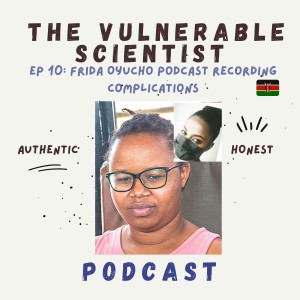
Tuesday Dec 14, 2021
Tuesday Dec 14, 2021
In this podcast, I discuss the hurdles that come with creating podcasts and finding scientists to be guests. Frida is a statistician who is transitioning to data science. She dealt with ART uptake in Nyamira county, Kenya among HIV patients.The Vulnerable Scientist is a Kenyan-based podcast that focuses on scientists' stories about their daily lives, work, and how they got to where they are. I am your host Sarah Nyakeri, a scientist, informal science communicator and a hiker. I am a multidisciplinary individual that does digital marketing and website design during my free time.The main questions asked that scientists are expected to answer vulnerable are: How are you, Introduce yourself, how did you become a scientist, What are the highs and lows you have experienced in your science career, tell the listeners about your hobbies, what question would you like to answer that has not been asked and how do you feel after having this conversation.Why did I start this podcast? You might ask. When doing my MSc project, my experiments started to fail at a certain period and it was very frustrating. I thought, If I finally get a new vaccine target for CBPP in cows, it would be all smiles but no one will ever know what I went through. I also wondered how many scientists were going through the same rough patch but did not openly talk about it?One day when I had just had a rough day, I talked into a mic about my day and I felt better. That was the first episode. At first, I thought it would just be journalling but after some fellow scientists heard it, they wanted to be Vulnerable too. Since then I have brought scientists from different fields to tell their stories of the highs and lows they have experienced with honesty and authenticity being the lead of our informal and long conversations.I enjoy asking questions since I am a naturally curious person. Feedback from the audience including scientists and non-scientists is the main motivation why I message scientists or accept their request to be on the podcast, schedule an interview, edit audio, design the artwork and post it and share it on social media platforms. It is a full-time job that requires me to spend from my pocket with no monetary returns so far but I enjoy it.If you want to be Vulnerable on the show, send me an audio message either on speak pipe (https://www.speakpipe.com/VulnerableScientistVoicemail ) or anchor (https://anchor.fm/thevulnerablescientist/message). If you want to talk about a certain topic in the science career space or anything as a scientist that might have nothing to with science but affects scientists, feel free to reach out too. The podcast is on social media @TVscientistPod and Website; TheVulnerablescientist.com. You can support the show (https://www.patreon.com/thevulnerablescientist) on Patreon or Paypal sarahnyanchera(at)gmail or Mpesa at (254)0718896962 under Sarah Nyakeri. See acast.com/privacy for privacy and opt-out information.
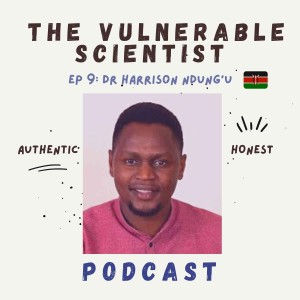
Monday Dec 13, 2021
Monday Dec 13, 2021
In this episode, we have a chat with a Kenyan Bioinformatician who is in the industry in Kenya explaining his highs and lows in the field.Dr. Harrison Ndung'u's LinkedIn Profile - https://www.linkedin.com/in/harrison-ndung-u-phd-94841b37The Vulnerable Scientist is a Kenyan-based podcast that focuses on scientists' stories about their daily lives, work, and how they got to where they are. I am your host Sarah Nyakeri, a scientist, informal science communicator and a hiker. I am a multidisciplinary individual that does digital marketing and website design during my free time.The main questions asked that scientists are expected to answer vulnerable are: How are you, Introduce yourself, how did you become a scientist, What are the highs and lows you have experienced in your science career, tell the listeners about your hobbies, what question would you like to answer that has not been asked and how do you feel after having this conversation.Why did I start this podcast? You might ask. When doing my MSc project, my experiments started to fail at a certain period and it was very frustrating. I thought, If I finally get a new vaccine target for CBPP in cows, it would be all smiles but no one will ever know what I went through. I also wondered how many scientists were going through the same rough patch but did not openly talk about it?One day when I had just had a rough day, I talked into a mic about my day and I felt better. That was the first episode. At first, I thought it would just be journalling but after some fellow scientists heard it, they wanted to be Vulnerable too. Since then I have brought scientists from different fields to tell their stories of the highs and lows they have experienced with honesty and authenticity being the lead of our informal and long conversations.I enjoy asking questions since I am a naturally curious person. Feedback from the audience including scientists and non-scientists is the main motivation why I message scientists or accept their request to be on the podcast, schedule an interview, edit audio, design the artwork and post it and share it on social media platforms. It is a full-time job that requires me to spend from my pocket with no monetary returns so far but I enjoy it.If you want to be Vulnerable on the show, send me an audio message either on speak pipe (https://www.speakpipe.com/VulnerableScientistVoicemail ) or anchor (https://anchor.fm/thevulnerablescientist/message). If you want to talk about a certain topic in the science career space or anything as a scientist that might have nothing to with science but affects scientists, feel free to reach out too. The podcast is on social media @TVscientistPod and Website; TheVulnerablescientist.com. You can support the show (https://www.patreon.com/thevulnerablescientist) on Patreon or Paypal sarahnyanchera(at)gmail or Mpesa at (254)0718896962 under Sarah Nyakeri. See acast.com/privacy for privacy and opt-out information.
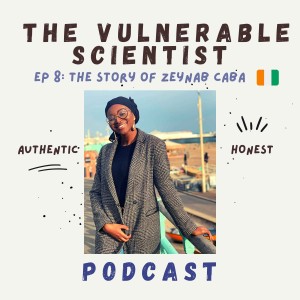
Friday Dec 10, 2021
Friday Dec 10, 2021
Zeynab Caba from the UK whose roots are in Ivory Coast tells her story of getting into biomedical science and finally switching to Health policy.This is repurposed interview from the science media Africa interviews done in collaboration with Planet wizard Africa The Vulnerable Scientist is a Kenyan-based podcast that focuses on scientists' stories about their daily lives, work, and how they got to where they are. I am your host Sarah Nyakeri, a scientist, informal science communicator and a hiker. I am a multidisciplinary individual that does digital marketing and website design during my free time.The main questions asked that scientists are expected to answer vulnerable are: How are you, Introduce yourself, how did you become a scientist, What are the highs and lows you have experienced in your science career, tell the listeners about your hobbies, what question would you like to answer that has not been asked and how do you feel after having this conversation.Why did I start this podcast? You might ask. When doing my MSc project, my experiments started to fail at a certain period and it was very frustrating. I thought, If I finally get a new vaccine target for CBPP in cows, it would be all smiles but no one will ever know what I went through. I also wondered how many scientists were going through the same rough patch but did not openly talk about it?One day when I had just had a rough day, I talked into a mic about my day and I felt better. That was the first episode. At first, I thought it would just be journalling but after some fellow scientists heard it, they wanted to be Vulnerable too. Since then I have brought scientists from different fields to tell their stories of the highs and lows they have experienced with honesty and authenticity being the lead of our informal and long conversations.I enjoy asking questions since I am a naturally curious person. Feedback from the audience, including scientists and non-scientists, is the main motivation I message scientists or accept their request to be on the podcast, schedule an interview, edit audio, design the artwork, post it, and share it on social media platforms. It is a full-time job that requires me to spend from my pocket with no monetary returns, but I enjoy it.If you want to be Vulnerable on the show, send me an audio message either on speak pipe (https://www.speakpipe.com/VulnerableScientistVoicemail ) or anchor (https://anchor.fm/thevulnerablescientist/message). Feel free to reach out too if you want to talk about a certain topic in the science career space or anything as a scientist that might have nothing to with science but affects scientists. The podcast is on social media @TVscientistPod and Website; TheVulnerablescientist.com. You can support the show (https://www.patreon.com/thevulnerablescientist) on Patreon or Paypal sarahnyanchera(at)gmail or Mpesa at (254)0718896962 under Sarah Nyakeri. See acast.com/privacy for privacy and opt-out information.
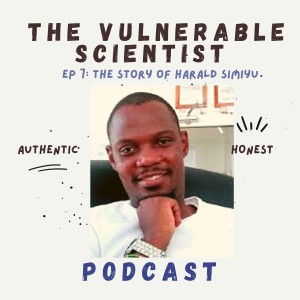
Thursday Dec 09, 2021
Thursday Dec 09, 2021
This is the story of a Kenyan Meteorologist working in Swaziland narrating his journey into his career path.This is repurposed interview from the science media Africa interviews done in collaboration with Planet wizard Africa The Vulnerable Scientist is a Kenyan-based podcast that focuses on scientists' stories about their daily lives, work, and how they got to where they are. I am your host Sarah Nyakeri, a scientist, informal science communicator and a hiker. I am a multidisciplinary individual that does digital marketing and website design during my free time.The main questions asked that scientists are expected to answer vulnerable are: How are you, Introduce yourself, how did you become a scientist, What are the highs and lows you have experienced in your science career, tell the listeners about your hobbies, what question would you like to answer that has not been asked and how do you feel after having this conversation.Why did I start this podcast? You might ask. When doing my MSc project, my experiments started to fail at a certain period and it was very frustrating. I thought, If I finally get a new vaccine target for CBPP in cows, it would be all smiles but no one will ever know what I went through. I also wondered how many scientists were going through the same rough patch but did not openly talk about it?One day when I had just had a rough day, I talked into a mic about my day and I felt better. That was the first episode. At first, I thought it would just be journalling but after some fellow scientists heard it, they wanted to be Vulnerable too. Since then I have brought scientists from different fields to tell their stories of the highs and lows they have experienced with honesty and authenticity being the lead of our informal and long conversations.I enjoy asking questions since I am a naturally curious person. Feedback from the audience, including scientists and non-scientists, is the main motivation I message scientists or accept their request to be on the podcast, schedule an interview, edit audio, design the artwork, post it, and share it on social media platforms. It is a full-time job that requires me to spend from my pocket with no monetary returns, but I enjoy it.If you want to be Vulnerable on the show, send me an audio message either on speak pipe (https://www.speakpipe.com/VulnerableScientistVoicemail ) or anchor (https://anchor.fm/thevulnerablescientist/message). Feel free to reach out too if you want to talk about a certain topic in the science career space or anything as a scientist that might have nothing to with science but affects scientists. The podcast is on social media @TVscientistPod and Website; TheVulnerablescientist.com. You can support the show (https://www.patreon.com/thevulnerablescientist) on Patreon or Paypal sarahnyanchera(at)gmail or Mpesa at (254)0718896962 under Sarah Nyakeri. See acast.com/privacy for privacy and opt-out information.
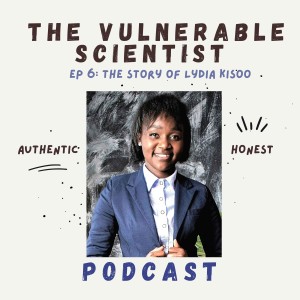
Wednesday Dec 08, 2021
Wednesday Dec 08, 2021
Lydia, currently a master's student at the University of Liverpool and a master's graduate ILRI fellow, tells her story.This is repurposed interview from the science media Africa interviews done in collaboration with Planet wizard Africa The Vulnerable Scientist is a Kenyan-based podcast that focuses on scientists' stories about their daily lives, work, and how they got to where they are. I am your host Sarah Nyakeri, a scientist, informal science communicator and a hiker. I am a multidisciplinary individual that does digital marketing and website design during my free time.The main questions asked that scientists are expected to answer vulnerable are: How are you, Introduce yourself, how did you become a scientist, What are the highs and lows you have experienced in your science career, tell the listeners about your hobbies, what question would you like to answer that has not been asked and how do you feel after having this conversation.Why did I start this podcast? You might ask. When doing my MSc project, my experiments started to fail at a certain period and it was very frustrating. I thought, If I finally get a new vaccine target for CBPP in cows, it would be all smiles but no one will ever know what I went through. I also wondered how many scientists were going through the same rough patch but did not openly talk about it?One day when I had just had a rough day, I talked into a mic about my day and I felt better. That was the first episode. At first, I thought it would just be journalling but after some fellow scientists heard it, they wanted to be Vulnerable too. Since then I have brought scientists from different fields to tell their stories of the highs and lows they have experienced with honesty and authenticity being the lead of our informal and long conversations.I enjoy asking questions since I am a naturally curious person. Feedback from the audience, including scientists and non-scientists, is the main motivation I message scientists or accept their request to be on the podcast, schedule an interview, edit audio, design the artwork, post it, and share it on social media platforms. It is a full-time job that requires me to spend from my pocket with no monetary returns, but I enjoy it.If you want to be Vulnerable on the show, send me an audio message either on speak pipe (https://www.speakpipe.com/VulnerableScientistVoicemail ) or anchor (https://anchor.fm/thevulnerablescientist/message). Feel free to reach out too if you want to talk about a certain topic in the science career space or anything as a scientist that might have nothing to with science but affects scientists. The podcast is on social media @TVscientistPod and Website; TheVulnerablescientist.com. You can support the show (https://www.patreon.com/thevulnerablescientist) on Patreon or Paypal sarahnyanchera(at)gmail or Mpesa at (254)0718896962 under Sarah Nyakeri. See acast.com/privacy for privacy and opt-out information.
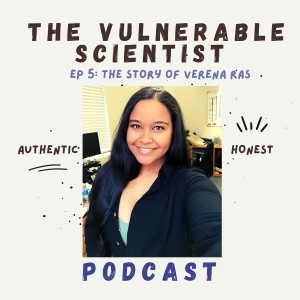
Tuesday Dec 07, 2021
Tuesday Dec 07, 2021
Verena Ras is a South African telling her story of navigating her science career. In the episode, she also talks about her highs and lows which are the highlight of the Vulnerable scientist podcast. This is a repurposed interview from the science media Africa interviews done in collaboration with Planet wizard Africa The Vulnerable Scientist is a Kenyan-based podcast that focuses on scientists' stories about their daily lives, work, and how they got to where they are. I am your host Sarah Nyakeri, a scientist, informal science communicator and a hiker. I am a multidisciplinary individual that does digital marketing and website design during my free time.The main questions asked that scientists are expected to answer vulnerable are: How are you, Introduce yourself, how did you become a scientist, What are the highs and lows you have experienced in your science career, tell the listeners about your hobbies, what question would you like to answer that has not been asked and how do you feel after having this conversation.Why did I start this podcast? You might ask. When doing my MSc project, my experiments started to fail at a certain period and it was very frustrating. I thought, If I finally get a new vaccine target for CBPP in cows, it would be all smiles but no one will ever know what I went through. I also wondered how many scientists were going through the same rough patch but did not openly talk about it?One day when I had just had a rough day, I talked into a mic about my day and I felt better. That was the first episode. At first, I thought it would just be journalling but after some fellow scientists heard it, they wanted to be Vulnerable too. Since then I have brought scientists from different fields to tell their stories of the highs and lows they have experienced with honesty and authenticity being the lead of our informal and long conversations.I enjoy asking questions since I am a naturally curious person. Feedback from the audience, including scientists and non-scientists, is the main motivation I message scientists or accept their request to be on the podcast, schedule an interview, edit audio, design the artwork, post it, and share it on social media platforms. It is a full-time job that requires me to spend from my pocket with no monetary returns, but I enjoy it.If you want to be Vulnerable on the show, send me an audio message either on speak pipe (https://www.speakpipe.com/VulnerableScientistVoicemail ) or anchor (https://anchor.fm/thevulnerablescientist/message). Feel free to reach out too if you want to talk about a certain topic in the science career space or anything as a scientist that might have nothing to with science but affects scientists. The podcast is on social media @TVscientistPod and Website; TheVulnerablescientist.com. You can support the show (https://www.patreon.com/thevulnerablescientist) on Patreon or Paypal sarahnyanchera(at)gmail or Mpesa at (254)0718896962 under Sarah Nyakeri. See acast.com/privacy for privacy and opt-out information.
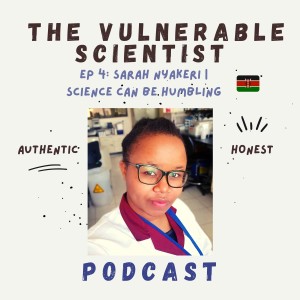
Monday Dec 06, 2021
Monday Dec 06, 2021
This is a story on what really pushed me into starting this podcasts as space for scientistsThe Vulnerable Scientist is a Kenyan-based podcast that focuses on scientists' stories about their daily lives, work, and how they got to where they are. I am your host Sarah Nyakeri, a scientist, informal science communicator and a hiker. I am a multidisciplinary individual that does digital marketing and website design during my free time.The main questions asked that scientists are expected to answer vulnerable are: How are you, Introduce yourself, how did you become a scientist, What are the highs and lows you have experienced in your science career, tell the listeners about your hobbies, what question would you like to answer that has not been asked and how do you feel after having this conversation.Why did I start this podcast? You might ask. When doing my MSc project, my experiments started to fail at a certain period and it was very frustrating. I thought, If I finally get a new vaccine target for CBPP in cows, it would be all smiles but no one will ever know what I went through. I also wondered how many scientists were going through the same rough patch but did not openly talk about it?One day when I had just had a rough day, I talked into a mic about my day and I felt better. That was the first episode. At first, I thought it would just be journalling but after some fellow scientists heard it, they wanted to be Vulnerable too. Since then I have brought scientists from different fields to tell their stories of the highs and lows they have experienced with honesty and authenticity being the lead of our informal and long conversations.I enjoy asking questions since I am a naturally curious person. Feedback from the audience including scientists and non-scientists is the main motivation why I message scientists or accept their request to be on the podcast, schedule an interview, edit audio, design the artwork and post it and share it on social media platforms. It is a full-time job that requires me to spend from my pocket with no monetary returns so far but I enjoy it.If you want to be Vulnerable on the show, send me an audio message either on speak pipe (https://www.speakpipe.com/VulnerableScientistVoicemail ) or anchor (https://anchor.fm/thevulnerablescientist/message). If you want to talk about a certain topic in the science career space or anything as a scientist that might have nothing to with science but affects scientists, feel free to reach out too. The podcast is on social media @TVscientistPod and Website; TheVulnerablescientist.com. You can support the show (https://www.patreon.com/thevulnerablescientist) on Patreon or Paypal sarahnyanchera(at)gmail or Mpesa at (254)0718896962 under Sarah Nyakeri. See acast.com/privacy for privacy and opt-out information.
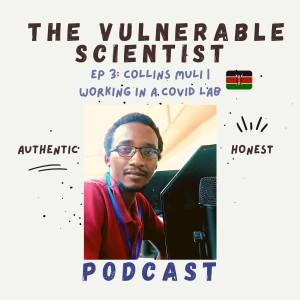
Friday Dec 03, 2021
Friday Dec 03, 2021
My Microphone was sitting around and Collins got curious about what I used it on. This is how we did this episode. As much as this was the first time he was a guest on a podcast, He is excited to do another episode. Let me know what you would like to ask him using my Twitter @NewBiochemist.The Vulnerable Scientist is a Kenyan-based podcast that focuses on scientists' stories about their daily lives, work, and how they got to where they are. I am your host Sarah Nyakeri, a scientist, informal science communicator and a hiker. I am a multidisciplinary individual that does digital marketing and website design during my free time.The main questions asked that scientists are expected to answer vulnerable are: How are you, Introduce yourself, how did you become a scientist, What are the highs and lows you have experienced in your science career, tell the listeners about your hobbies, what question would you like to answer that has not been asked and how do you feel after having this conversation.Why did I start this podcast? You might ask. When doing my MSc project, my experiments started to fail at a certain period and it was very frustrating. I thought, If I finally get a new vaccine target for CBPP in cows, it would be all smiles but no one will ever know what I went through. I also wondered how many scientists were going through the same rough patch but did not openly talk about it?One day when I had just had a rough day, I talked into a mic about my day and I felt better. That was the first episode. At first, I thought it would just be journalling but after some fellow scientists heard it, they wanted to be Vulnerable too. Since then I have brought scientists from different fields to tell their stories of the highs and lows they have experienced with honesty and authenticity being the lead of our informal and long conversations.I enjoy asking questions since I am a naturally curious person. Feedback from the audience including scientists and non-scientists is the main motivation why I message scientists or accept their request to be on the podcast, schedule an interview, edit audio, design the artwork and post it and share it on social media platforms. It is a full-time job that requires me to spend from my pocket with no monetary returns so far but I enjoy it.If you want to be Vulnerable on the show, send me an audio message either on speak pipe (https://www.speakpipe.com/VulnerableScientistVoicemail ) or anchor (https://anchor.fm/thevulnerablescientist/message). If you want to talk about a certain topic in the science career space or anything as a scientist that might have nothing to with science but affects scientists, feel free to reach out too. The podcast is on social media @TVscientistPod and Website; TheVulnerablescientist.com. You can support the show (https://www.patreon.com/thevulnerablescientist) on Patreon or Paypal sarahnyanchera(at)gmail or Mpesa at (254)0718896962 under Sarah Nyakeri. See acast.com/privacy for privacy and opt-out information.
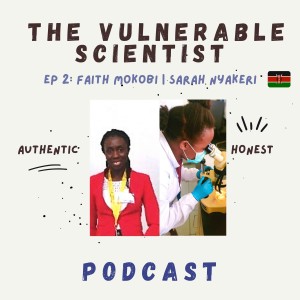
Thursday Dec 02, 2021
Thursday Dec 02, 2021
Faith Mokobi is a PhD Student in North Carolina researching Nanoparticles in cancer. I am going to attempt another call for my next episode for this.The Vulnerable Scientist is a Kenyan-based podcast that focuses on scientists' stories about their daily lives, work, and how they got to where they are. I am your host Sarah Nyakeri, a scientist, informal science communicator and a hiker. I am a multidisciplinary individual that does digital marketing and website design during my free time.The main questions asked that scientists are expected to answer vulnerable are: How are you, Introduce yourself, how did you become a scientist, What are the highs and lows you have experienced in your science career, tell the listeners about your hobbies, what question would you like to answer that has not been asked and how do you feel after having this conversation.Why did I start this podcast? You might ask. When doing my MSc project, my experiments started to fail at a certain period and it was very frustrating. I thought, If I finally get a new vaccine target for CBPP in cows, it would be all smiles but no one will ever know what I went through. I also wondered how many scientists were going through the same rough patch but did not openly talk about it?One day when I had just had a rough day, I talked into a mic about my day and I felt better. That was the first episode. At first, I thought it would just be journalling but after some fellow scientists heard it, they wanted to be Vulnerable too. Since then I have brought scientists from different fields to tell their stories of the highs and lows they have experienced with honesty and authenticity being the lead of our informal and long conversations.I enjoy asking questions since I am a naturally curious person. Feedback from the audience including scientists and non-scientists is the main motivation why I message scientists or accept their request to be on the podcast, schedule an interview, edit audio, design the artwork and post it and share it on social media platforms. It is a full-time job that requires me to spend from my pocket with no monetary returns so far but I enjoy it.If you want to be Vulnerable on the show, send me an audio message either on speak pipe (https://www.speakpipe.com/VulnerableScientistVoicemail ) or anchor (https://anchor.fm/thevulnerablescientist/message). If you want to talk about a certain topic in the science career space or anything as a scientist that might have nothing to with science but affects scientists, feel free to reach out too. The podcast is on social media @TVscientistPod and Website; TheVulnerablescientist.com. You can support the show (https://www.patreon.com/thevulnerablescientist) on Patreon or Paypal sarahnyanchera(at)gmail or Mpesa at (254)0718896962 under Sarah Nyakeri. See acast.com/privacy for privacy and opt-out information.
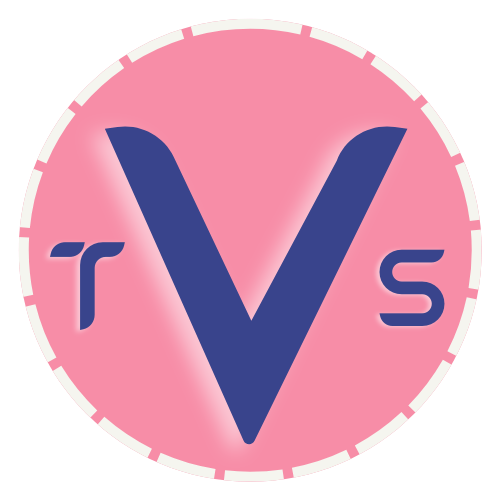
About
Only scientists who are honest and authentic or are working towards it will be on this podcast.
Professor Brene Brown’s research shows that vulnerability fosters good emotional and mental health. It is a sign of courage. We become more resilient and brave when we embrace who we truly are and what we are feeling. The Vulnerable Scientist Podcast is a space for scientists to tell their honest and authentic stories.
I am your host Sarah Nyakeri who happens to be a scientist, and Informal science communicator and I help scientists create personal websites.
If you want to support this show, go to www.patreon.com/thevulnerablescientist.com You can also follow this podcast on all social media platforms @TVScientistPod
